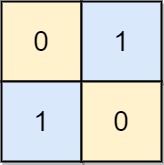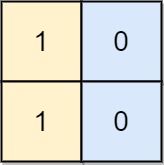| comments | difficulty | edit_url | tags | ||||
|---|---|---|---|---|---|---|---|
true |
Hard |
|
You are given an n x n binary grid board. In each move, you can swap any two rows with each other, or any two columns with each other.
Return the minimum number of moves to transform the board into a chessboard board. If the task is impossible, return -1.
A chessboard board is a board where no 0's and no 1's are 4-directionally adjacent.
Example 1:
Input: board = [[0,1,1,0],[0,1,1,0],[1,0,0,1],[1,0,0,1]] Output: 2 Explanation: One potential sequence of moves is shown. The first move swaps the first and second column. The second move swaps the second and third row.
Example 2:
Input: board = [[0,1],[1,0]] Output: 0 Explanation: Also note that the board with 0 in the top left corner, is also a valid chessboard.
Example 3:
Input: board = [[1,0],[1,0]] Output: -1 Explanation: No matter what sequence of moves you make, you cannot end with a valid chessboard.
Constraints:
n == board.lengthn == board[i].length2 <= n <= 30board[i][j]is either0or1.
In a valid chessboard, there are exactly two types of "rows".
For example, if one row on the chessboard is "01010011", then any other row can only be "01010011" or "10101100". Columns also satisfy this property.
Additionally, each row and each column has half $0$s and half $1$s. Suppose the chessboard is
- If
$n = 2 \times k$ , then each row and each column has$k$ $1$s and$k$ $0$s. - If
$n = 2 \times k + 1$ , then each row has$k$ $1$s and$k + 1$ $0$s, or$k + 1$ $1$s and$k$ $0$s.
Based on the above conclusions, we can determine whether a chessboard is valid. If valid, we can calculate the minimum number of moves required.
If
If
The time complexity is
class Solution:
def movesToChessboard(self, board: List[List[int]]) -> int:
def f(mask, cnt):
ones = mask.bit_count()
if n & 1:
if abs(n - 2 * ones) != 1 or abs(n - 2 * cnt) != 1:
return -1
if ones == n // 2:
return n // 2 - (mask & 0xAAAAAAAA).bit_count()
return (n + 1) // 2 - (mask & 0x55555555).bit_count()
else:
if ones != n // 2 or cnt != n // 2:
return -1
cnt0 = n // 2 - (mask & 0xAAAAAAAA).bit_count()
cnt1 = n // 2 - (mask & 0x55555555).bit_count()
return min(cnt0, cnt1)
n = len(board)
mask = (1 << n) - 1
rowMask = colMask = 0
for i in range(n):
rowMask |= board[0][i] << i
colMask |= board[i][0] << i
revRowMask = mask ^ rowMask
revColMask = mask ^ colMask
sameRow = sameCol = 0
for i in range(n):
curRowMask = curColMask = 0
for j in range(n):
curRowMask |= board[i][j] << j
curColMask |= board[j][i] << j
if curRowMask not in (rowMask, revRowMask) or curColMask not in (
colMask,
revColMask,
):
return -1
sameRow += curRowMask == rowMask
sameCol += curColMask == colMask
t1 = f(rowMask, sameRow)
t2 = f(colMask, sameCol)
return -1 if t1 == -1 or t2 == -1 else t1 + t2class Solution {
private int n;
public int movesToChessboard(int[][] board) {
n = board.length;
int mask = (1 << n) - 1;
int rowMask = 0, colMask = 0;
for (int i = 0; i < n; ++i) {
rowMask |= board[0][i] << i;
colMask |= board[i][0] << i;
}
int revRowMask = mask ^ rowMask;
int revColMask = mask ^ colMask;
int sameRow = 0, sameCol = 0;
for (int i = 0; i < n; ++i) {
int curRowMask = 0, curColMask = 0;
for (int j = 0; j < n; ++j) {
curRowMask |= board[i][j] << j;
curColMask |= board[j][i] << j;
}
if (curRowMask != rowMask && curRowMask != revRowMask) {
return -1;
}
if (curColMask != colMask && curColMask != revColMask) {
return -1;
}
sameRow += curRowMask == rowMask ? 1 : 0;
sameCol += curColMask == colMask ? 1 : 0;
}
int t1 = f(rowMask, sameRow);
int t2 = f(colMask, sameCol);
return t1 == -1 || t2 == -1 ? -1 : t1 + t2;
}
private int f(int mask, int cnt) {
int ones = Integer.bitCount(mask);
if (n % 2 == 1) {
if (Math.abs(n - ones * 2) != 1 || Math.abs(n - cnt * 2) != 1) {
return -1;
}
if (ones == n / 2) {
return n / 2 - Integer.bitCount(mask & 0xAAAAAAAA);
}
return (n / 2 + 1) - Integer.bitCount(mask & 0x55555555);
} else {
if (ones != n / 2 || cnt != n / 2) {
return -1;
}
int cnt0 = n / 2 - Integer.bitCount(mask & 0xAAAAAAAA);
int cnt1 = n / 2 - Integer.bitCount(mask & 0x55555555);
return Math.min(cnt0, cnt1);
}
}
}class Solution {
public:
int n;
int movesToChessboard(vector<vector<int>>& board) {
n = board.size();
int mask = (1 << n) - 1;
int rowMask = 0, colMask = 0;
for (int i = 0; i < n; ++i) {
rowMask |= board[0][i] << i;
colMask |= board[i][0] << i;
}
int revRowMask = mask ^ rowMask;
int revColMask = mask ^ colMask;
int sameRow = 0, sameCol = 0;
for (int i = 0; i < n; ++i) {
int curRowMask = 0, curColMask = 0;
for (int j = 0; j < n; ++j) {
curRowMask |= board[i][j] << j;
curColMask |= board[j][i] << j;
}
if (curRowMask != rowMask && curRowMask != revRowMask) return -1;
if (curColMask != colMask && curColMask != revColMask) return -1;
sameRow += curRowMask == rowMask;
sameCol += curColMask == colMask;
}
int t1 = f(rowMask, sameRow);
int t2 = f(colMask, sameCol);
return t1 == -1 || t2 == -1 ? -1 : t1 + t2;
}
int f(int mask, int cnt) {
int ones = __builtin_popcount(mask);
if (n & 1) {
if (abs(n - ones * 2) != 1 || abs(n - cnt * 2) != 1) return -1;
if (ones == n / 2) return n / 2 - __builtin_popcount(mask & 0xAAAAAAAA);
return (n + 1) / 2 - __builtin_popcount(mask & 0x55555555);
} else {
if (ones != n / 2 || cnt != n / 2) return -1;
int cnt0 = (n / 2 - __builtin_popcount(mask & 0xAAAAAAAA));
int cnt1 = (n / 2 - __builtin_popcount(mask & 0x55555555));
return min(cnt0, cnt1);
}
}
};func movesToChessboard(board [][]int) int {
n := len(board)
mask := (1 << n) - 1
rowMask, colMask := 0, 0
for i := 0; i < n; i++ {
rowMask |= board[0][i] << i
colMask |= board[i][0] << i
}
revRowMask := mask ^ rowMask
revColMask := mask ^ colMask
sameRow, sameCol := 0, 0
for i := 0; i < n; i++ {
curRowMask, curColMask := 0, 0
for j := 0; j < n; j++ {
curRowMask |= board[i][j] << j
curColMask |= board[j][i] << j
}
if curRowMask != rowMask && curRowMask != revRowMask {
return -1
}
if curColMask != colMask && curColMask != revColMask {
return -1
}
if curRowMask == rowMask {
sameRow++
}
if curColMask == colMask {
sameCol++
}
}
f := func(mask, cnt int) int {
ones := bits.OnesCount(uint(mask))
if n%2 == 1 {
if abs(n-ones*2) != 1 || abs(n-cnt*2) != 1 {
return -1
}
if ones == n/2 {
return n/2 - bits.OnesCount(uint(mask&0xAAAAAAAA))
}
return (n+1)/2 - bits.OnesCount(uint(mask&0x55555555))
} else {
if ones != n/2 || cnt != n/2 {
return -1
}
cnt0 := n/2 - bits.OnesCount(uint(mask&0xAAAAAAAA))
cnt1 := n/2 - bits.OnesCount(uint(mask&0x55555555))
return min(cnt0, cnt1)
}
}
t1 := f(rowMask, sameRow)
t2 := f(colMask, sameCol)
if t1 == -1 || t2 == -1 {
return -1
}
return t1 + t2
}
func abs(x int) int {
if x < 0 {
return -x
}
return x
}

